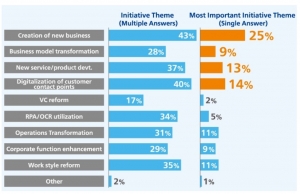Improved digital human resources needed
In the November report, Minister of Information and Communications Nguyen Manh Hung said that Vietnam currently had approximately 1.2 million employees in information technology (IT), but for workers with college degrees and above there were only about 550,000 people.
In the human resources structure, the ratio of information technology human resources to the total labour force was around 1 per cent. This is relatively low compared to 4 per cent in the US, 2.5 per cent in South Korea, and 1.78 per cent in India. Meanwhile, the number of students graduating from information technology majors, including colleges and universities, is only about 60,000 - 70,000 people each year.
Nguyen Manh Dung, general partner of Do Ventures, said the demand for IT human resources for technology companies had increased dramatically during the pandemic. Many countries worldwide are ready to recruit workers in Vietnam, India, the Philippines, and China, aiming to reduce costs. Businesses in any field also need IT workers to operate and process information.
Nguyen Trung Chinh, chairman of CMC Corporation, said that the demand for IT human resources was very high. However, currently, universities have yet to meet both quantity and quality, only meeting about 25 per cent of demand in terms of quantity. By 2030, the market will need 1.5 million IT workers.
“CMC is expected to become a global enterprise with a turnover of $1 billion and a scale of more than 10,000 employees by 2025. Currently, CMC, with a team of 4,200 people, has a great demand for recruitment but faces many difficulties because the supply is insufficient," Chinh said.
Lacking the right quantity and quality in digital human resources is a headache for managers. Park JongHo, CEO of TopDev, said that the wave of foreign investment had brought many opportunities for Vietnam's IT labour market to expand and become more vibrant.
Some IT companies in the region are eyeing Vietnam as a potential destination to recruit workers and build teams of product development engineers. Many traditional tourism, agriculture, and real estate businesses have digitally transformed and entered the e-commerce model. This creates more pressure on IT human resource shortages.
According to Vietnam IT Market Report – Tech Hiring 2022 published in September, despite being sought after with attractive salaries, the supply of human resources in the IT field has not yet met the demand and growth rate required.
 |
Solutions
Minister Hung said promoting university training was one of the important solutions to respond to the lack of digital human resources.
He said that to develop digital human resources, the state should enact policies to encourage training institutions to promote digital training and build digital universities.
"CMC focuses on investing in education, aiming not only to create high-quality human resources to serve our corporation's demand but also contribute to human resources for society," he added.
Nguyen Thanh Nam, founder of FUNiX University, predicts that soon, learning IT will not only be for those who specialise in this sector, but for workers in many other sectors.
"The cooperation between enterprises and educational institutions is essential to fill the shortage of human resources, especially high-quality workers," said Nam.
Nguyen Ngoc Dung, an expert at the National Innovation Center, said Vietnam had the advantage of a golden population in terms of age, but it was not yet "golden in quality."
“To solve the problem of lack of quantity and poor quality of digital human resources, the government needs to assign agencies to develop specific training programs and strategies. Additionally, contests should be organised for students, especially female students, to motivate them to learn about information technology. If training is not enough to meet the demand, it is necessary to look into importing workers from abroad,” Dung said.
Experts believe the government should increase investment in digital human resource training, set criteria and have a clear vision for the development and completion of legal documents in the field. In addition, enterprises must closely coordinate with universities and vocational colleges to share practical knowledge.
Training institutions also need to change their training curricula and teaching methods and improve the qualifications of teachers in line with market demands.
 | Digital transformation with smart factories proves urgent The Vietnamese manufacturing industry has a great opportunity to catch up with the Smart Factory trend and contribute more deeply to the global value chain. |
 | Digital transformation the key to sustainable development We are living in a decade where science and technology have brought tangible changes to every aspect of our lives. It’s also in this decade when climate change has accelerated at an unprecedented rate. Such context poses a crucial challenge for businesses to shape and transform into more sustainable, comprehensive and flexible business models. |
 | Growth with Industry 4.0: What are the sufficient conditions? Digital transformation and Industry 4.0 are widely recognised as important stimuli for enterprise growth, yet what is really needed to make them work for Vietnamese businesses? RMIT University researchers reveal what insiders think. |
 | Estuary: a companion for enterprises on digital transformation journey As a digital transformation consultant and specialist in delivering growth-hacking technology in sales and marketing, Estuary is well-positioned to advise and create valuable solutions for clients. |
 | Neobanking: a trend-setting model for the digital revolution With the achievements of Industry 4.0, digital transformation has become a strong movement in all sectors in recent years. Finance-banking is one of the sectors prioritised in digital transformation since it is one of the backbones playing a vital role in the national economy, as stated in the National Digital Transformation Programme towards 2025, with an orientation to 2030. |
What the stars mean:
★ Poor ★ ★ Promising ★★★ Good ★★★★ Very good ★★★★★ Exceptional
Related Contents
Latest News
More News
- Masan Consumer names new deputy CEO to drive foods and beverages growth (February 23, 2026 | 20:52)
- Myriad risks ahead, but ones Vietnam can confront (February 20, 2026 | 15:02)
- Vietnam making the leap into AI and semiconductors (February 20, 2026 | 09:37)
- Funding must be activated for semiconductor success (February 20, 2026 | 09:20)
- Resilience as new benchmark for smarter infrastructure (February 19, 2026 | 20:35)
- A golden time to shine within ASEAN (February 19, 2026 | 20:22)
- Vietnam’s pivotal year for advancing sustainability (February 19, 2026 | 08:44)
- Strengthening the core role of industry and trade (February 19, 2026 | 08:35)
- Future orientations for healthcare improvements (February 19, 2026 | 08:29)
- Infrastructure orientations suitable for a new chapter (February 19, 2026 | 08:15)

 Tag:
Tag:

















 Mobile Version
Mobile Version